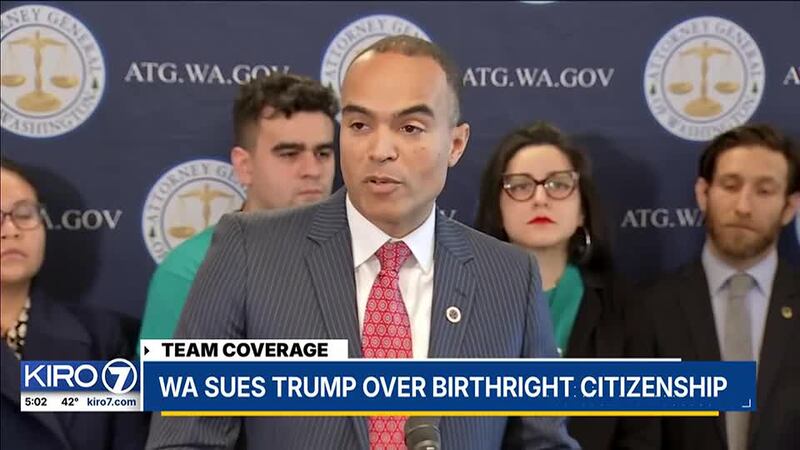SEATTLE — Reaction to one of the early executive orders from President Donald Trump has been swift as 22 state attorneys general file suit against the White House’s attempt to roll back an immigration law known as birthright citizenship.
The opening line in the 14th Amendment states “All persons born or naturalized in the United States, and subject to the jurisdiction thereof, are citizens of the United States and of the State wherein they reside.”
In 1898, during the Chinese Exclusion Act, the U.S. Supreme Court affirmed that the 14th Amendment extended to children of parents without legal citizenship. The Trump Administration and its supporters say the Executive Order aims to “clarify” the law and state it only applies if neither parent has legal status.
“We need to let the federal executive branch, the federal legislative branch and yes, the federal judicial branch work out the details of a complicated and long-standing issue in immigration law,” said Jim Walsh, the chair of the Washington GOP and current State Representative in Washington, representing Aberdeen.
Washington Attorney General Nick Brown was one of 22 state AGs who filed suit one day after the executive order was issued. Brown says the law has been settled, pointing to the United States Supreme Court ruling more than 120 years ago.
“This is plainly illegal,” Brown said of the order, “This one is fairly obvious, not only is it spelled out specifically in our constitution, the Supreme Court has specifically weighed in on the case.”
The original passage of the 14th Amendment gave former slaves leaving the Confederacy during the Civil War citizenship status, otherwise leaving them without a nation or state to belong to. Today, Thrive International Executive Director Mark Finney says the amendment has a similar role for those seeking asylum from political persecution or refuge from war.
“They could be essentially undocumented people in every country of the world for the rest of their lives. That’s just not an American thing to do. That’s not a human rights thing to do,” Finney said, “We’re creating this sort of shadow residency that is frankly going to make worse this issue of undocumented immigration that Trump has said he wants to fix.”
Walsh argues those who legally seek asylum or refuge will be unaffected by this order, saying, “If you’re misusing asylum, maybe you have something to worry about.”
“It has a long and storied history in our country of this as public policy. It is an issue that should be decided in Washington, D.C., by the legislators, by the president, and if necessary, by even the U.S. Supreme Court,”
Walsh contends this is a different kind of issue than Roe v. Wade which affirmed abortion rights for decades across the country. He argues that was an issue to return the right to the state, though Finney contends that upended a precedent, leaving him and other immigrant rights organizations worried more could be upended.
“It’s an open question. We’re seeing a challenge we’ve never seen before. We have a dynamic on the Supreme Court that’s different than it has been for a long, long time.” Finney said.
For his part, Brown believes SCOTUS will stick to its previous ruling if it gets that far.
“My hope is every level of court, the district court, the court of appeals, if we go to the Supreme Court, would rule unanimously because of the well-established precedent.
©2025 Cox Media Group








